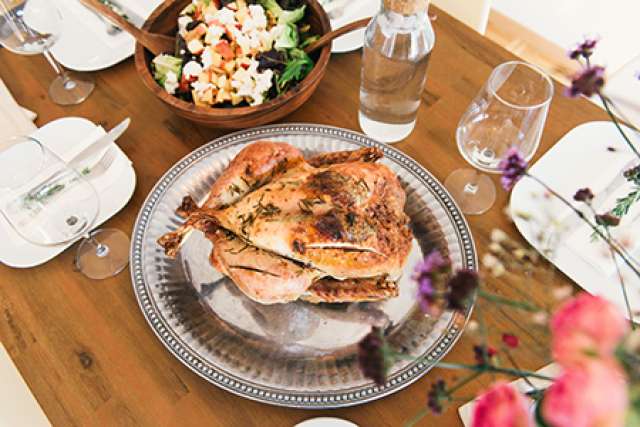The holidays are a time of merriment, often centered on food. While the energy during the festive season is at a high, for health-conscious folks it can create unneeded stress around personal food consumption.
Erin Morse, chief clinical dietitian at the Ronald Reagan UCLA Medical Center, shares how to remove the guilt from eating delicious meals, and how holiday partygoers can honor their bodies, feelings and traditions through a practice called intuitive eating. Studies have found that intuitive eaters have a lower body mass index, or BMI, better cholesterol and triglyceride levels, take more pleasure in their eating, and eat a healthier diet than those who do not eat intuitively.
What is intuitive eating?
Developed in 1995 by two registered dietitians, Evelyn Tribole and Elyse Resch, intuitive eating is an evidence-based eating philosophy that promotes a healthy attitude toward food and body image. The foundation of intuitive eating ditches diet culture — eat when you are hungry, stop when you are full, eat foods that truly satisfy, and manage emotions without using food. When we choose food based on flavor, taste, texture, aroma, and not based on fat grams or calories, the eating experience is more satisfying, and we are actually likely to eat less food in the end.
How can we practically apply the practice of intuitive eating at the holiday table?
It is a personal journey and no two people will experience intuitive eating the same. Intuitive eating is set up as 10 different principles. For the holidays, principles 5, 6 and 9 are good guidelines; principle 5 is "Respect Your Fullness," principle 6 is "Discover the Satisfaction Factor" and principle 9 is "Exercise — Feel the Difference." Reading your body and acknowledging its "full" signals are key during the holiday season.
How can you better listen to your body, and prime yourself for a food fest?
Go into a holiday dinner with a positive attitude, gratitude and joy. This will shape how you approach your food.
Some other key practices:
- Get a good sleep: Lack of sleep often contributes to stress, affecting your hunger hormones, ghrelin and leptin, which regulate hunger and thereby stimulate the appetite. Before a huge holiday party, make sure to get a good seven to eight hours of sleep.
- Hydrate all day: Have a big glass of water before heading to your dinner. We often mistake hunger cues for the body's hydration needs.
- Exercise: Get adequate activity before and after the holiday. Consider a run outside, group weight training or heated yoga that work up a good sweat.
- Eat protein: Aim for a protein-rich snack a few hours before a big dinner to combat hunger. Avoid going to a party hungry — you will definitely end up overeating.
- Treat yourself: Do not deprive yourself of your favorite holiday food — this may lead to an unplanned binge. Treat yourself with your favorites and avoid foods that do not give you pleasure.
How does stress hinder intuitive eating?
Stress can play a huge role in overeating during the holidays, especially when hot topics on sensitive issues may arise at the dinner table. Ask yourself, are you reaching for an indulgent food due to physical or emotional reasons? If you are emotionally eating, find a non-food distraction. Walk around the room to find a family member to chat with, take a walk, play with kids at the party, listen to music, or call a friend.
If you do reach for food, make sure to snack healthy. Aim for crunchy veggies, fresh fruit, a handful of nuts or a large glass of lemon water or tea. Stay away from those hard-to-resist comfort foods.
If you feel too overwhelmed during the holiday seasons, get support. Lean on family and friends when stress gets bad. Try a stress management technique, such as yoga, meditation or deep breathing. Alternatively, consider joining a support group or seek professional help.
At the end of the day, does splurging on one meal make that much of an impact?
No, one large meal will not make an impact. The weight scale may move higher, but it is likely water weight and bloat caused by the high-carb, indulgent and sodium-rich meal. There are lot of healthy holiday foods you can tap into, including green salad, roasted vegetables, nuts, lean protein, root vegetables and brussels sprouts.



